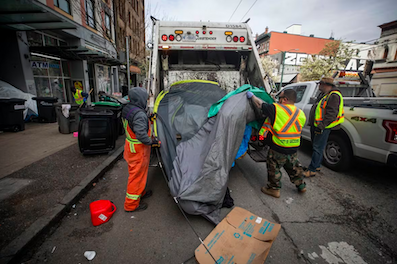City says it has requested police support to `bring the East Hastings encampment to a close`
Police moved into Vancouver`s Downtown Eastside on Wednesday morning as the city began carrying out its plan to remove a street encampment from the neighbourhood.
East Hastings Street, where people have been living in tents and make-shift structures, has been shut down at Main Street while the process begins.
In a statement, the City of Vancouver said it has requested support from the Vancouver Police Department to "bring the East Hastings encampment to a close," citing public safety and an increase of fires in the area.
It was a culmination of eight months of tensions over the encampment, the fourth major one in Vancouver in as many years, as bylaw officers and police worked in tandem over the cries of opposition from those in the tents and those advocating for them.
In a news conference Wednesday morning, city manager Paul Mochrie said the encampment has made the area more dangerous, and the goal is to have all the structures removed by the end of the day.
"This is about dealing with a very serious public safety issue," said Mochrie.
Vancouver Fire Rescue Services reported more than 400 outdoor fires on East Hastings in the last eight months that injured four people. The Vancouver Police Department says there has been a nine per cent increase in assaults in the neighbourhood since last August, when the encampment began.
In July, Vancouver Fire Chief Karen Fry issued an order to remove structures on the street because of extreme fire risk. Fry says it`s since gotten worse.
"What we are seeing is more tents come down, and more tents go up, and it`s not getting any better," said Fry. "It is a matter of time before more lives are lost."
Vancouver Mayor Ken Sim told reporters fire, police and city staff are one unified team with a common purpose.
"We need to restore Hastings as a street that is safe and welcoming for everyone," Sim said.
Krusty Poirer, 43, says he has lived in a structure on the street for two years and makes sure every day that he keeps it and the surrounding area tidy and that there is a clear pathway for pedestrians.
"I want to do my thing and be left alone."
Poirer said because police arrived in the morning, and many living on East Hastings are substance users, plenty of people were probably looking for their first fix of the day and didn`t know their homes were at risk of removal.
"A lot of us are sick," said Poirer. "Half of them don`t even know because they are gone getting better right now."
Poirer expects people who have their homes removed today will return, just like he says happened in August after Fry issued her order. City staff also took down structures then, forcing dozens of people to move.
"Go away a day or two and come right back — that`s what we did last time," he said.
This latest removal of structures comes in the wake of leaked city documents that show a two-stage plan for the process.
That leak raised concerns among advocates who work with people experiencing homelessness and mental health and substance use issues living in the East Hastings encampment.
"We`re going to do everything we can to make sure that they feel human after this process because it`s a very dehumanizing process," said Ryan Sudds, a member of Stop the Sweeps.
Sudds said the organization has a team of legal observers who will be keeping an eye on how the removals are conducted.
In an open letter issued Wednesday afternoon, a coalition of DTES networks representing organizations, non-profits, social enterprises and residents responded to the city`s current decampment process.
The letter says the plan will only serve to further traumatize the community and perpetuate tensions between police, city officials and DTES residents. It also says 89 units of housing promised by the city and province are not yet available and that city`s actions will not get people off the streets.
"We call on the City of Vancouver and the Province of British Columbia to prioritize the provision of adequate housing and support services for those in need first, rather than displace individuals," said the letter, signed by The Coordinated Community Response Network (CCRN), Exchange Inner City, and the Vancouver Urban Core Frontline Worker`s Association.
Tent communities in Vancouver have been a common sight.
Two years ago in April, Public Safety Minister Mike Farnworth told campers at the city`s Oppenheimer Park that they could leave or choose to accept the housing they were offered.
More than 200 campers had been living in the park for months after they were kicked out of Crab Park.
Many of those campers moved to nearby Strathcona Park, which was also shut down months later after complaints of escalating crime.
The Pivot Legal Society, which advocates for those on the Downtown Eastside, calls the dismantling of the Hastings Street site a "gross human rights violation.``
"There is nowhere for people to go,`` it said in a tweet. "[This is] a massive waste of public resources and a dangerous ploy to pretend to be doing something.``
The decision to remove the Hastings Street camp comes despite a B.C. Supreme Court order from Justice F. Matthew Kirchner, who said Vancouver`s park board wasn`t justified in issuing two eviction orders for those living in Crab Park.
Kirchner found the orders unreasonably assumed there were enough indoor shelter spaces to accommodate campers who had been forced out.
Similar court orders have since been made allowing camps to remain in Victoria and Prince George.
Photo: City employees shove a tent into a garbage truck on the Downtown Eastside on April 5, 2023. The city says its goal is to remove all structures on Hastings Street used by people experiencing homelessness by the end of the day. Source: Ben Nelms/CBC.














